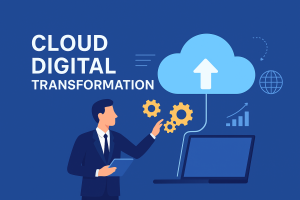In today’s fast-moving digital world, businesses are under immense pressure to innovate, deliver value faster, and stay ahead of competitors. Customers demand seamless experiences, efficient solutions, and constant improvements. To meet these challenges, many organizations are turning to Product Engineering Services (PES).
But what exactly are product engineering services, and why are they becoming so critical for modern businesses? This guide will explain everything you need to know about PES—what they are, why they matter, and how they can transform your business.
What Are Product Engineering Services?
Product Engineering Services (PES) refer to the end-to-end process of designing, developing, testing, deploying, and maintaining a product throughout its entire lifecycle. Unlike traditional development, which often focuses only on coding or a specific stage, PES covers the full spectrum of bringing a product from an idea to reality—and beyond.
It’s not just about writing software. PES combines engineering expertise, digital innovation, and business strategy to create products that are efficient, scalable, and user-friendly.
Why Are Product Engineering Services Important for Businesses?
Today’s competitive environment requires businesses to deliver faster, smarter, and better products. With PES, companies can:
- Reduce time-to-market by leveraging agile methodologies
- Ensure products are scalable, secure, and future-ready
- Enhance customer experiences with modern features and design
- Reduce operational costs through automation and optimization
- Continuously evolve with maintenance and innovation
In short, PES empowers businesses to innovate without compromising quality or efficiency.
The Product Engineering Lifecycle
Product Engineering Services span the entire product lifecycle. Let’s break it down into key stages:
1. Ideation and Conceptualization
- Market research and competitor analysis
- Identifying customer needs and pain points
- Brainstorming product ideas and features
2. Product Design and Prototyping
- UX/UI design to ensure usability and customer satisfaction
- Prototyping for early validation
- Gathering user feedback before development
3. Development and Engineering
- Writing scalable, high-quality code
- Leveraging modern tech stacks (cloud, AI, IoT, microservices)
- Agile or DevOps-based iterative development
4. Testing and Quality Assurance (QA)
- Functional, performance, and security testing
- Automated testing for faster delivery cycles
- Ensuring compliance with industry standards
5. Deployment and Integration
- Seamless deployment to cloud or on-premises environments
- Integration with existing systems and tools
- Continuous delivery pipelines for faster updates
6. Maintenance and Support
- Regular updates and feature enhancements
- Bug fixes and performance monitoring
- Long-term product scalability and security improvements
Key Services Offered in Product Engineering
Product engineering is broad and includes a variety of services tailored to business needs:
- Product Strategy & Consulting – aligning product vision with business goals
- Software Development – full-stack, mobile, and cloud-native applications
- UI/UX Design – user-centric product experiences
- Cloud Engineering – cloud migration, DevOps, and infrastructure management
- Data & AI Solutions – predictive analytics, automation, and personalization
- IoT Product Engineering – smart devices and connected solutions
- Product Modernization – updating legacy systems with new technologies
- Testing & Quality Assurance – ensuring reliability and compliance
Benefits of Product Engineering Services for Businesses
1. Faster Time-to-Market
PES leverages agile methodologies, CI/CD pipelines, and automation, enabling companies to launch products faster than competitors.
2. Cost Efficiency
By outsourcing or partnering with PES experts, businesses reduce infrastructure costs and avoid hiring large in-house teams.
3. Innovation and Competitive Advantage
PES providers bring expertise in cutting-edge technologies such as AI, IoT, blockchain, and cloud, giving your product an innovative edge.
4. Scalability and Flexibility
Products are designed to grow with your business, ensuring scalability without performance issues.
5. Focus on Core Business
By delegating product development and engineering tasks, businesses can focus on strategy, sales, and customer relationships.
Industries Leveraging Product Engineering Services
PES isn’t limited to just tech companies—it’s transforming industries across the board:
- Healthcare – telemedicine apps, AI-powered diagnostics
- Finance – secure fintech solutions, mobile banking apps
- Retail & E-commerce – personalized shopping experiences, AR/VR commerce
- Manufacturing – IoT-enabled smart factories, predictive maintenance
- Education – eLearning platforms, AI tutors
- Logistics & Supply Chain – real-time tracking, demand forecasting
How to Choose the Right Product Engineering Partner
Not all PES providers are equal. Here’s what to look for when choosing the right partner:
- Expertise in Your Industry – proven track record with relevant case studies
- End-to-End Capabilities – covering strategy, development, and support
- Agile and Scalable Approach – ability to adapt to your evolving needs
- Technology Expertise – proficiency in cloud, AI, IoT, and DevOps
- Customer Support – post-deployment assistance and continuous improvement
Future of Product Engineering Services
As businesses embrace digital transformation, PES will continue to evolve. Key future trends include:
- AI-driven development – automated coding and smart testing
- Edge computing – real-time product responses for IoT devices
- Sustainable engineering – eco-friendly product designs and energy efficiency
- Digital twins – virtual models for simulation and optimization
- Hyper-personalization – AI-based user experiences tailored for individuals
Businesses that adopt these future-ready product engineering strategies will not only thrive but also set new benchmarks in their industries.
Conclusion
Product Engineering Services are no longer optional—they’re a necessity for businesses that want to stay relevant, innovate faster, and deliver top-notch customer experiences. By leveraging PES, companies can accelerate product development, ensure scalability, and remain competitive in a constantly changing market.
Whether you’re a startup with a groundbreaking idea or an enterprise modernizing legacy systems, partnering with the right PES provider can make the difference between success and failure.
Frequently Asked Questions (FAQs)
Q1: What is the difference between product development and product engineering?
A1: Product development focuses mainly on building the product, while product engineering covers the entire lifecycle—design, development, testing, deployment, and maintenance.
Q2: Can small businesses benefit from Product Engineering Services?
A2: Yes. PES helps small businesses bring ideas to market quickly, reduce costs, and compete with larger enterprises.
Q3: Which technologies are commonly used in Product Engineering?
A3: Cloud computing, AI/ML, IoT, blockchain, and DevOps are widely used in product engineering services.
Q4: Is outsourcing Product Engineering Services cost-effective?
A4: Absolutely. Outsourcing reduces infrastructure and hiring costs while giving access to global expertise.
Q5: How long does it take to build a product with PES?
A5: Timelines vary depending on complexity, but agile methodologies allow businesses to release MVPs (Minimum Viable Products) faster.
Call-to-Action Looking to bring your product idea to life or modernize existing solutions? Explore our Product Engineering Services to innovate faster, reduce costs, and stay ahead of your competition. Contact Redtgs today for a free consultation!






